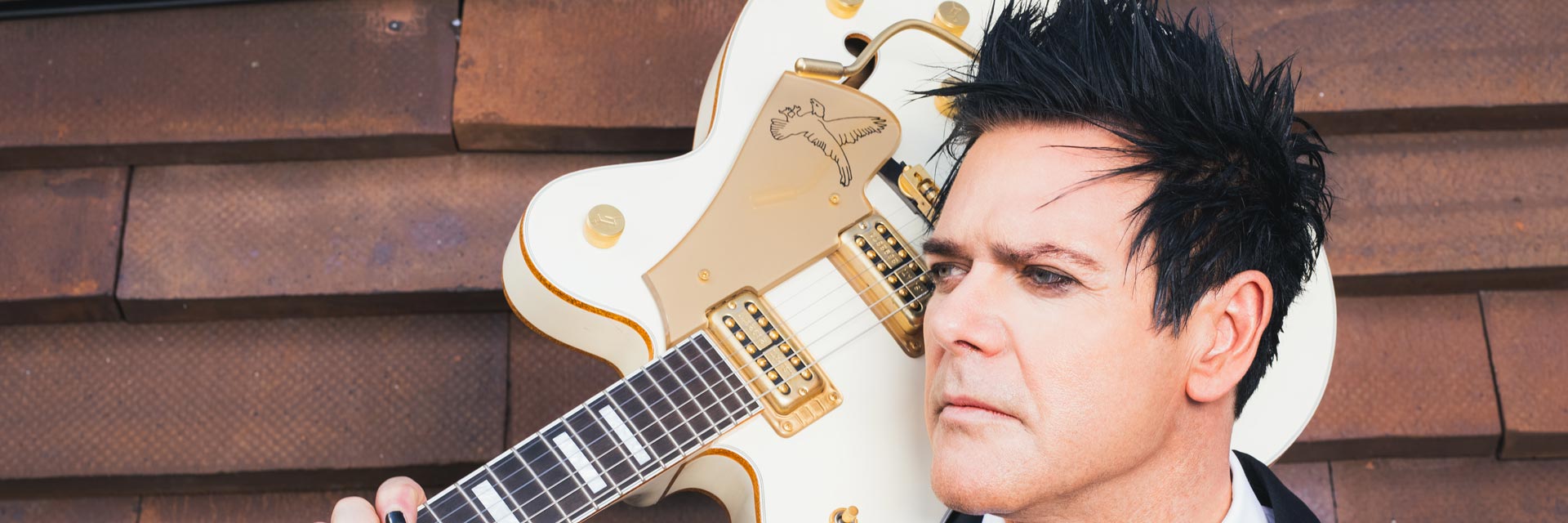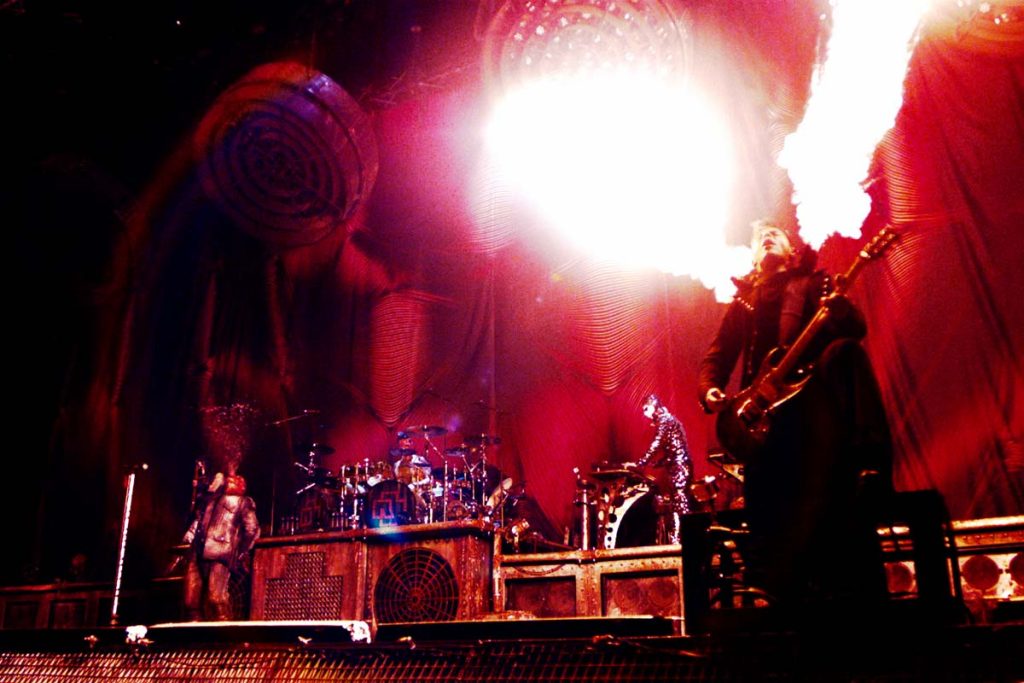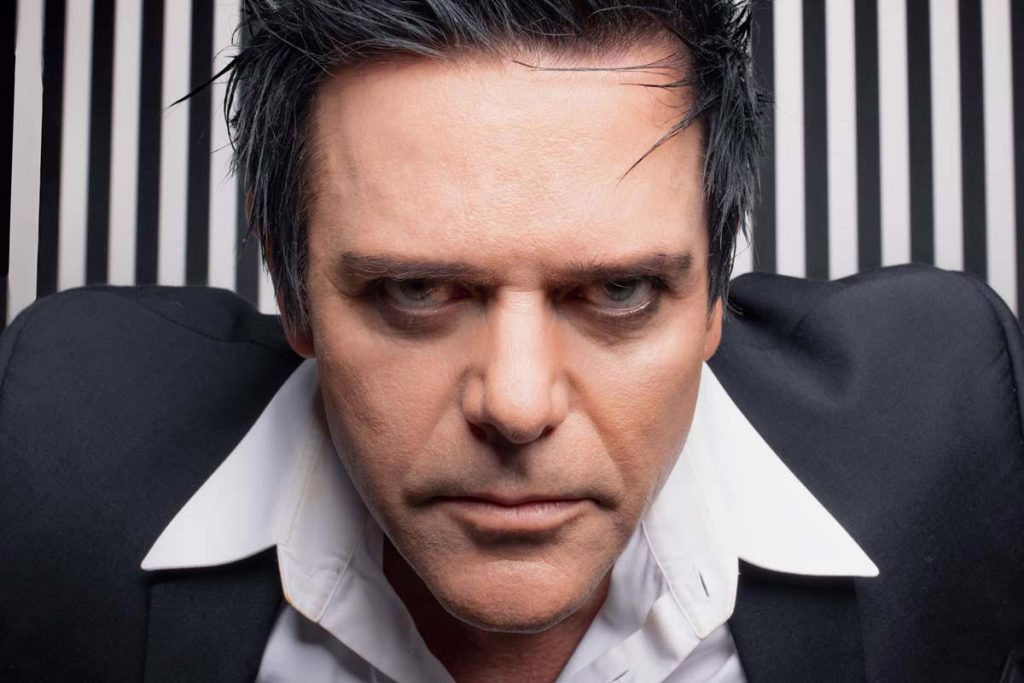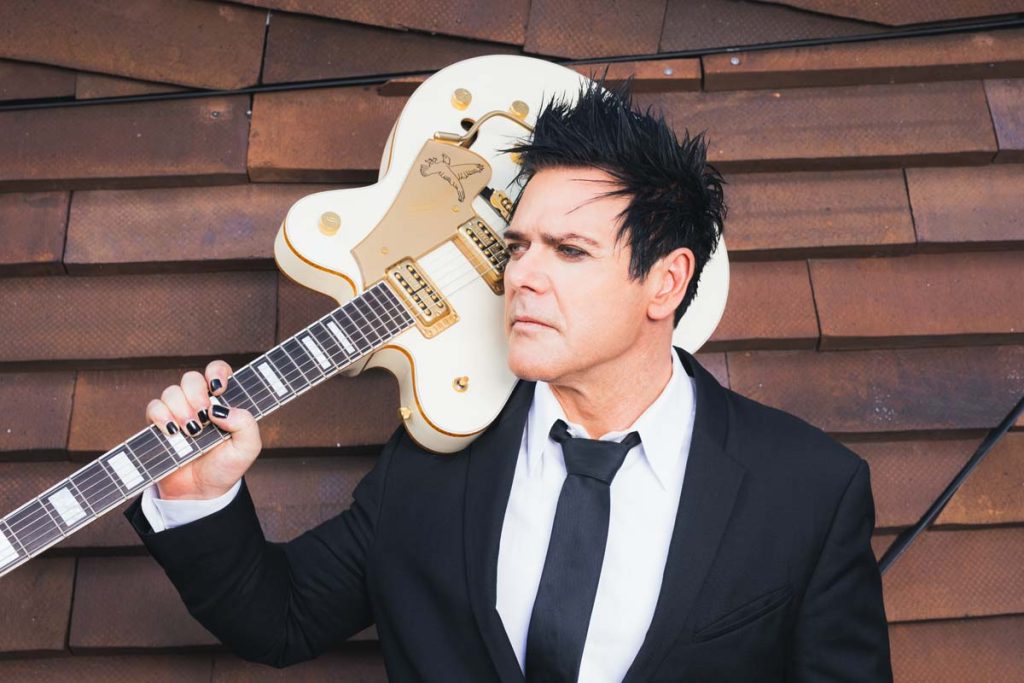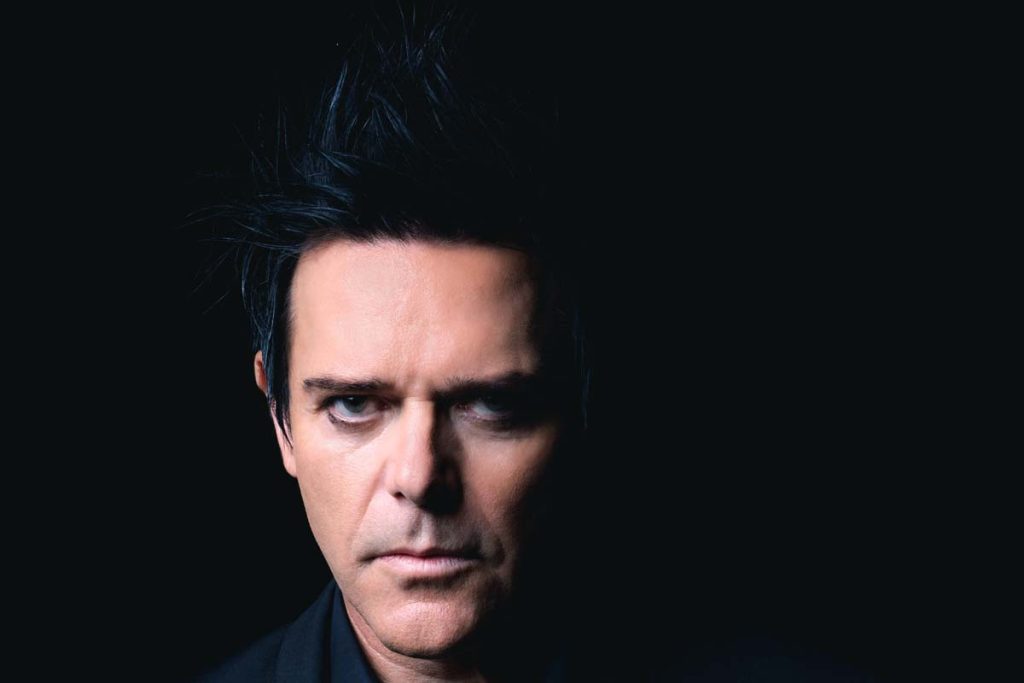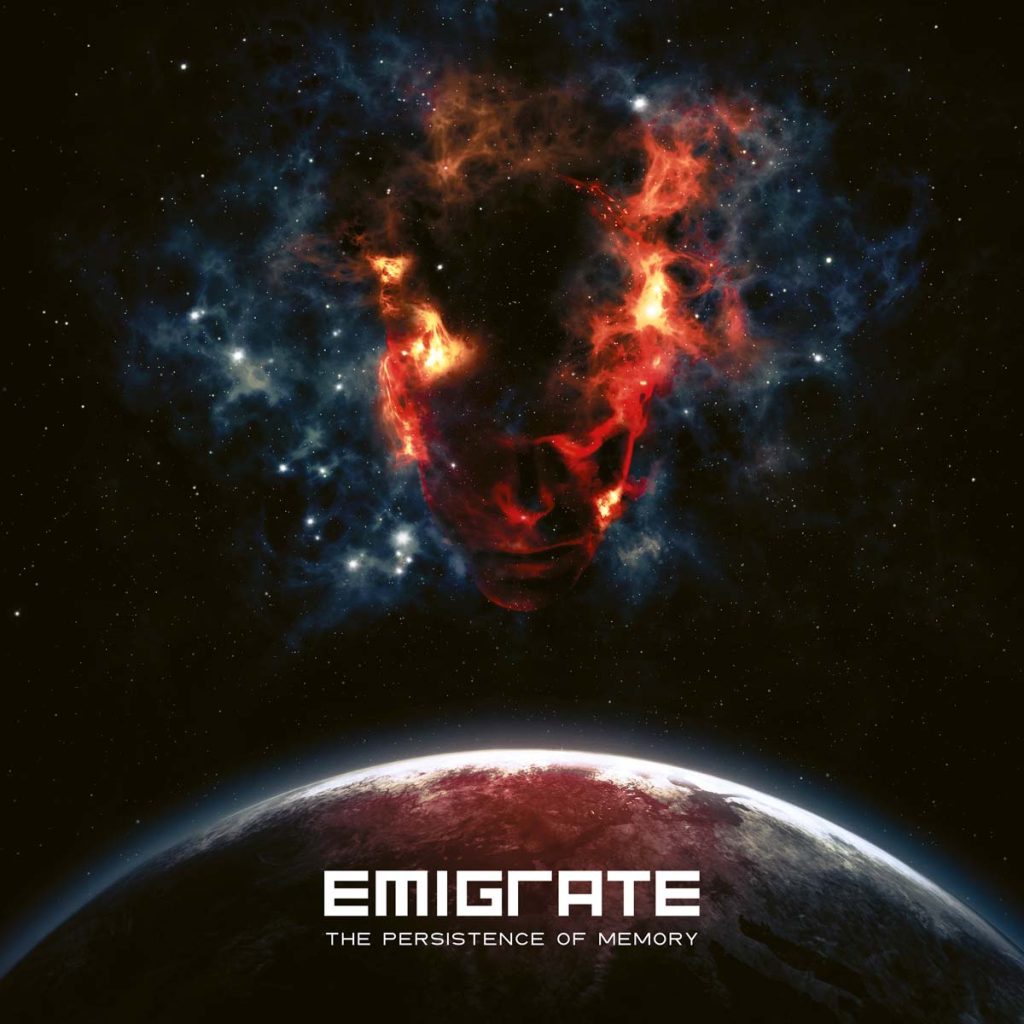With Rammstein, he plays guitar flanked by flamethrowers. With his solo project Emigrate, however, Richard Kruspe concentrates entirely on the music. The Persistence Of Memory is the band’s fourth album. In this interview with FIDELITY, Kruspe talks about the sound qualities of an old GDR broadcasting building, his self-developed microphone robots – and the rock’n’roll qualities of Rammstein singer Till Lindemann.
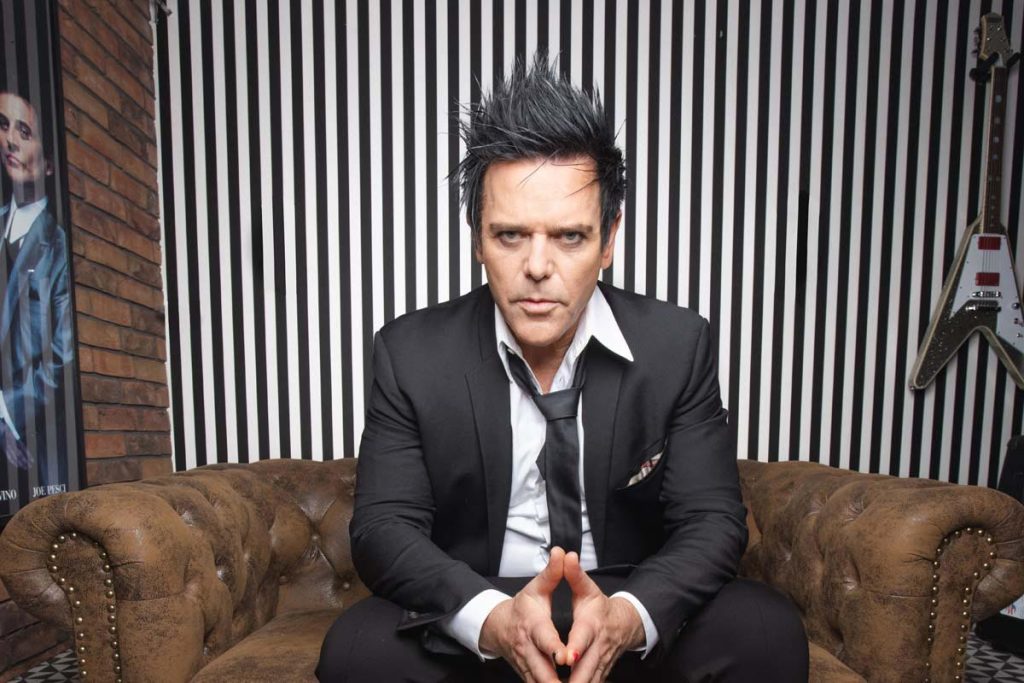
FIDELITY: Mr. Kruspe, today we’re talking quite classically via telephone. Take me with you into your world: Where am I reaching you right now?
Richard Kruspe: In my basement. I’m sitting here right now in my barber store. I set it up during the Corona pandemic. At first it was just for hair styling. But in the meantime I feel very comfortable down here in the dark. By the way, we can switch to first names if you like.
All right. So do your dark rock songs originate between hair gel bottles and washbasins?
I actually have a studio down here too, my second studio. The other one is upstairs in the penthouse, which is awash with sunlight. I need this alternating between light and dark. It inspires me to create completely different worlds of sound. Say though, the room you’re sitting in right now, it has some massive reverb to it. It sounds enormous!
That’s just the conference room in our office.
But it sounds like I should drop by to do a bit of drum recording sometime.
I guess I should give my colleagues a fair warning then … but let’s get to the new Emigrate album, The Persistence Of Memory. You’ve written some of the songs on this album as many as 20 years ago. Why didn’t you compose any new ones?
That has to do with the end of the last Rammstein stadium tour in 2019. When you’re used to hearing just how awesome you are from thousands of people every day, it can be pretty hard to deal with when it all suddenly stops. I fell into a deep dark hole, I had lost all motivation to make music. To pull myself out of it again, I travelled back to my own past. My ideas from the formative years of Emigrate helped my find myself again.
Emigrate started to take shape 20 years ago, when you moved to New York. Today, you live in Berlin again. Shouldn’t the band be called “Immigrate” now?
(Laughs) To me, “Emigrate” is not so much of a moving abroad thing as it is about breaking out. About leaving my own comfort zone. Incidentally, I’ve moved back here as early as 2011, so I could watch my third child grow up here.
Freeze My Mind, the first single to be released from the new album, has been created in 2001. Did you need to make adjustments to the sound so it fits in with the present?
Yes, I re-recorded everything apart from the drums. I’ve kept those, though, because they had been recorded in the Funkhaus in Nalepa Street in Berlin, in the old broadcasting building of the GDR. It’s among Germany’s best sounding dru recording rooms. But true, some of the sounds and ideas that seemed cool 20 years ago, I had to redo. Not all things retro sound nice in a retro way. Some things just didn’t age well and sound like stuff that no one wants to hear anymore.
You know a thing or two about re-recording stuff: You had to record A Million Degrees from 2018 a second time after the studio, including all hard drives, was completely destroyed in a flooding situation.
A tragedy that was. I had to retake everything by memory alone. That wasn’t all that different from the normal day to day studio business though. I basically never start at square one when writing a song. Every composition builds on something. Sometimes it’s some idea from the past, sometimes it’s just a groove. As for when I came up with it, I can’t really tell anymore. I do, however, know how to repair roofs now. I had to replace the entire roof back then, 1600 litres of water had ingressed there. I have answers for quite a few questions regarding that … (laughs)
Are you a good handyman? For your studio work, you have constructed bespoke microphone robots that automatically align themselves in relation to the loudspeakers.
The robots help me find the sweet spot, the ideal position for the microphones. In the classic guitar recording process with amp, loudspeaker and microphone you are constantly searching for the perfect sound. To find it, you essentially need a second person in the studio. One in the control room, the other at the mic with the loudspeakers. Otherwise, you have to scurry back and forth on your own to reposition the microphones. The problem is that everytime you switch between rooms, your hearing changes. The robots do away with all that.
You grew up in the GDR, have lived in the USA and are on tours across the entire world with Rammstein. How do locations influence your sound?
The studio, the city, my current emotional state – all of that has an influence on my sound. Artists need to be able to feel out all manner of energies and internalize them. I’m extremely sensitive in that regard.
Does Berlin transport you into a different sound cosmos than New York?
Definitely. New York is lively, fast paced and intense. In East Village all I had to do is take a walk around the block and I would already have dozens of impressions to inspire me to write a new song. With Berlin, I don’t seem to have this kind of synergy these days. Maybe I’ve just grown older though.
For Emigrate, you’ve recently recruited a young colleage with Italian DJ Andrea Marino.
My daughter’s boyfriend. Modern, young influence is vital. I’m interested in watching how music evolves. Rock music as a form of rebellion has long had its day, right? Now we’re living in a digital world. Nobody has the patience to listen through an entire album, everybody’s just skipping from song to song on Spotify. And that does beg the question for me: Will this change the way we write songs? Is a new revolution in music imminent?
It does seem to change the way you write songs: You recently stated that your next album might end up being a purely electronic one.
I’ve always had a soft spot for electronic music. I loved bands like Kraftwerk and later Depeche Mode. With Rammstein, electronic sound are a staple as well. The way I write songs did change over time, though. In the past, the starting point was always a guitar riff, then everything else would develop around that. That’s how I’ve been making music for 20 years – the simplest kind of songwriting really. I have grown since then, I play more instruments, the piano, among others. With Emigrate, I seek to tackle new challenges. A purely electronic album would be just that: A completely new challenge.
You can already hear how this might sound in “Get Down” from 2014. “Music for a visit to a strip club” is how you described it once. Is this your target audience?
Not at all. I never understood the whole strip club concept and I’ve always found it to be terrible. Whenever I listen to or write music, I have images in my head. In the case of “Get Down”, this was a stripper. When no image forms in my head, it means that the song is still missing something. Once an image has solidified, I start building the lyrics around that.
What image do you have in your head for “Always On My Mind” from the new album?
Mother Earth. That’s also how the cover art came to be.
Elvis Presley has made this song famous. Are you secretly passionate about old Rock’n’Roll?
Much rather about Elvis – though I’ve never been an Elvis fan. His voice is impressive to me. Originally, I planned for Elvis’ original voice to feature on the track. As I was playing around with that, I was suitably impressed. A singer that will dominate a song in such a clear and unique fashion, regardless of how I arranged it – amazing. But then I thought about who else could sing this song.
And you came to the conclusion that your Rammstein band mate Till Lindemann would make for the best surrogate Elvis.
Before that, I actually thought Iggy Pop. I’ve already been in touch with him. But then Till came to my mind. His voice is also quite unmistakable, after all.
So, is Till Lindemann the Elvis of our age?
Both are capricorns, in any event. And both possess a voice that can penetrate any sound. But the Elvis of our age? Phew, that’s for others to judge.
How do you go about ensuring that an Emigrate song with Till Lindemann vocals sounds different from a Rammstein song?
I used to keep Emigrate and Rammstein strictly separately. All things riff-based went into the ideas folder for Rammstein. And everything that had a vocal component in addition to that, I filed under Emigrate. Today, there’s only one ideas folder. By now, vocal melodies are something I can comtribute to Rammstein as well. For the song “Deutschland”, for instance, I’ve tossed Till quite a few ideas.
The music videos to the Emigrate songs tend to be set in end time scenarios. Your soundscapes are also gloomy most of the time. A peek into the soul of Richard Kruspe?
All artists turn their inner life to the outside in a creative way. My world is often gloomy. To exaggerate: I feel more comfortable in minor than in major.
Some songs, however, are closer to the major, “You’re So Beautiful” on the penultimate record, “Come Over” from the new one.
It’s interesting that you mention those two of all songs. Those are actually songs that I dedicated to my children. They have the power to pull me out of dark places. Well observed, I gotta say.
You’ve already got the late Motörhead frontman Lemmy Kilmister as well as Marylin Manson to sing on Emigrate. Are there also artists you haven’t dared to approach yet?
Two, actually. Martin Gore from Depeche Mode and Trent Reznor from Nine Inch Nails. Though I’ve been in touch with Gore before. As for Reznor, not yet. The way he brings harmonies together really hits a chord with me.
In the GDR you were once a DJ, or more precisely: a record entertainer.
I simply wanted to make music. To stand on the stage. That could have just as well been a brass band. Ended up being a record entertainer.
What was your bouncer song?
(laughs) Mate, that was so long ago … But I still remember which song I always particularly liked to play.
What was it?
“Rock & Roll Part 2” by Gary Glitter. The crowd really got down to that one.
EMIGRATE
Emigrate is the solo project of Richard Kruspe (54), guitarist of the German rock band Rammstein. The eponymous debut album Emigrate was released in 2007, and The Persistence Of Memory is the name of the new, fourth album. In the past, Kruspe has repeatedly invited well-known guest artists to the studio, such as Frank Dellé from the hip-hop collective Seeed or Motörhead frontman Lemmy Kilmister. On the new album, however, an old acquaintance sings on one song: Rammstein colleague Till Lindemann. Richard Kruspe grew up in a Brandenburg village in the GDR. In his youth he was a successful wrestler, later he trained as a cook, worked as a DJ on the side, learned to play guitar and played in various punk bands. In 1994, he was one of the co-founders of the industrial rock group Rammstein, one of the most successful bands in German music history. After eleven years in New York, Kruspe today lives in Berlin again.

